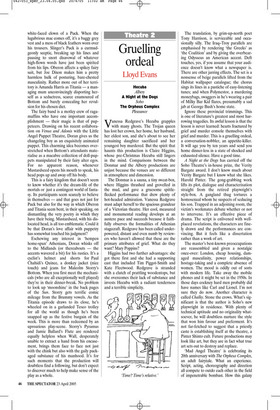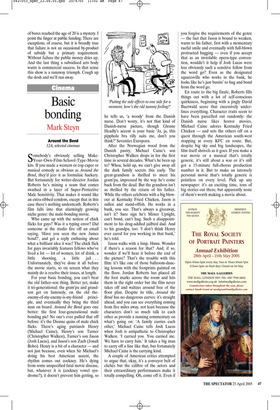Gruelling ordeal
Lloyd Evans
Hecuba Albery A Night at the Dogs Soho The Orpheus Complex Pleasance
Vanessa Redgrave’s Hecuba grapples with many ghosts. The Trojan queen has lost her crown, her home, her husband, her eldest son, and she’s about to see her remaining daughter sacrificed and her youngest boy murdered. But the spirit that haunts this production is Claire Higgins, whose pre-Christmas Hecuba still lingers in the mind. Comparisons between the Donmar and the Albery productions are unjust because the venues are so different in atmosphere and dimension.
The Donmar is a sauna, a tiny sweat-box, where Higgins thrashed and grovelled in the mud, and gave a gruesome spittleflecked performance that drew plenty of hot-headed admiration. Vanessa Redgrave must adapt herself to the spacious grandeur of a Victorian theatre. Her cool, measured and monumental reading develops at an austere pace and succeeds because it faithfully observes the formalities of Athenian stagecraft. Redgrave has been called underpowered, distant and even numb by reviewers who haven’t allowed that these are the primary attributes of grief. What do they want? Mary Poppins?
Higgins had two further advantages: she got there first and she had a supporting cast that included Tim Piggot-Smith and Kate Fleetwood. Redgrave is stranded with a clutch of prattling woodentops, but she overcomes their lack of substance and invests Hecuba with a radiant tenderness and a terrible simplicity. The translation, by grim-up-north poet Tony Harrison, is serviceable and occasionally silly. The Iraq–Troy parallels are emphasised by rendering ‘the Greeks’ as ‘the Coalition’ and by giving the overbearing Odysseus an American accent. Deft touches, yes, if you assume that your audience doesn’t know what a newspaper is. There are other jarring effects. The set is a nonsense of beige parallels lifted from the Habitat wallpaper catalogue; the chorus sings its lines in a pastiche of easy-listening tunes; and when Polymestor, a murdering moneybags, swaggers in he’s wearing a pair of Milky Bar Kid flares, presumably a sad jab at George Bush’s home state.
Ignore these provincial trimmings. This is one of literature’s greatest and most harrowing tragedies. Its awful lesson is that the lesson is never learned: hearts fractured by grief and murder console themselves with grief and murder. This is a gruelling ordeal, a conversation-nobbler, an appetite-killer. It will age you by ten years and send you home dinner-less in a state of shocked and exhausted silence. Have a good time.
A Night at the Dogs has carried off the Soho Theatre’s in-house prize, the Verity Bargate award. I don’t know much about Verity Bargate but I know what she likes. Harold Pinter. The gong-grabbing work lifts its plot, dialogue and characterisation straight from the retired playwright’s style-box. A gangland thug tortures a homosexual whom he suspects of seducing his son. Trapped in an adjoining room, the victim’s workmates debate whether or not to intervene. It’s an effective piece of drama. The script is enlivened with wellplaced revelations, the characters are finely drawn and the performances are convincing. But it feels like a dissertation rather than a work of art.
The master’s best-known preoccupations are reassembled and given a nostalgic once-over: London, cheap housing, damaged masculinity, power relationships, hostage-taking and a complete absence of women. The mood is oddly out of sorts with modern life. Take away the mobile phones and it might be set in the 1950s. In those days cockney hard men probably did have names like Carl and Lionel. I’m not sure they do now. Another character is called Chalky. Stone the crows. What’s significant is that the author is Soho’s new playwright in residence. With plenty of technical aptitude and no originality whatsoever, he will doubtless nurture the style that won him favour and preferment. It’s not far-fetched to suggest that a priestly caste is establishing itself at the theatre, a Pinter Shinto cult. Future productions may look like art, but they are in fact what true art sets out to destroy and replace.
‘Mad Angel Theatre’ is celebrating its 20th anniversary with The Orpheus Complex, an adult fairytale. What an experience. Script, acting, choreography and direction all compete to outdo each other in the field of impenetrable bombast. How this galaxy of bores reached the age of 20 is a mystery. I point the finger at public funding. There are exceptions, of course, but it is broadly true that failure is not an occasional by-product of subsidy but a primary requirement. Without failure the public money dries up. And the last thing a subsidised arts body wants is commercial success. In that sense this show is a runaway triumph. Cough up the dosh and we’ll run away.




















































 Previous page
Previous page